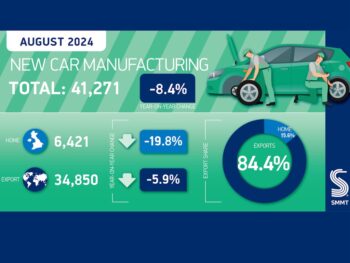Car output down 8% as OEMs transition to EVs
UK car production fell 8.4% in August in an ongoing trend that’s primarily due to model switchovers and the move to EVs.

The fall is primarily due to model switchovers at plants and the move to EVs
Output stood at 41,271 units during the traditionally quiet ‘summer shutdown’ month; down by 3,781 units year on year.
The fall continues the trend seen across the year, as factories wind down production of various models and retool for new – primarily electric – model production, following the £24bn of UK automotive manufacturing investment announced last year. Key changes include JLR’s revamp of its Halewood site to build ICE, hybrid and electric Range Rovers, as announced today.
The SMMT data for August also reveals that electrified (battery electric, plug-in hybrid and hybrid) production for the month fell by 25.9%, leading to a fall in the market share of output to 29.6%. Such a decline will be reversed in the longer term as new models come onstream.
Production for the domestic market dropped by 19.8% – but the figure was skewed by the small overall output volume for the month and the fact that the vast majority of UK production is for export.
Exports fell by a more modest 5.9%, largely due to changeovers of models built for EU markets. However, the EU remains by far the biggest export destination, comprising 49.8% of total exports. The US (17.0%), China (6.5%), Japan (5.1%) and Australia (4.4%) made up the remaining top five export destinations for UK car production, with growth in both the American and Japanese markets.

Production for the UK dropped by 19.8% while exports declined by a more modest 5.9%
Year to date, UK car production is down 8.5% at 522,823 units and output for the UK market is up 12.3% despite the domestic decline in August.
Mike Hawes, SMMT chief executive, said the traditional summer shutdowns and factory retool work was always going to lead to a quieter month but stressed that the sector remains optimistic about a return to growth, after the record levels of investment announced last year.
“Realising those investments and securing more depends on the UK industry maintaining its competitiveness so we look forward both to the Chancellor’s Autumn Budget and the Government’s proposed Industrial Strategy as critical opportunities to demonstrate that it backs auto,” he commented.
“Labour’s Automotive Sector Plan, launched at their Party Conference a year ago, should be the blueprint with its proposals for cheaper, green energy, skills investment and the cultivation of healthy markets here and abroad. These are the measures that would enable the industry to drive economic growth in every part of the country.”














